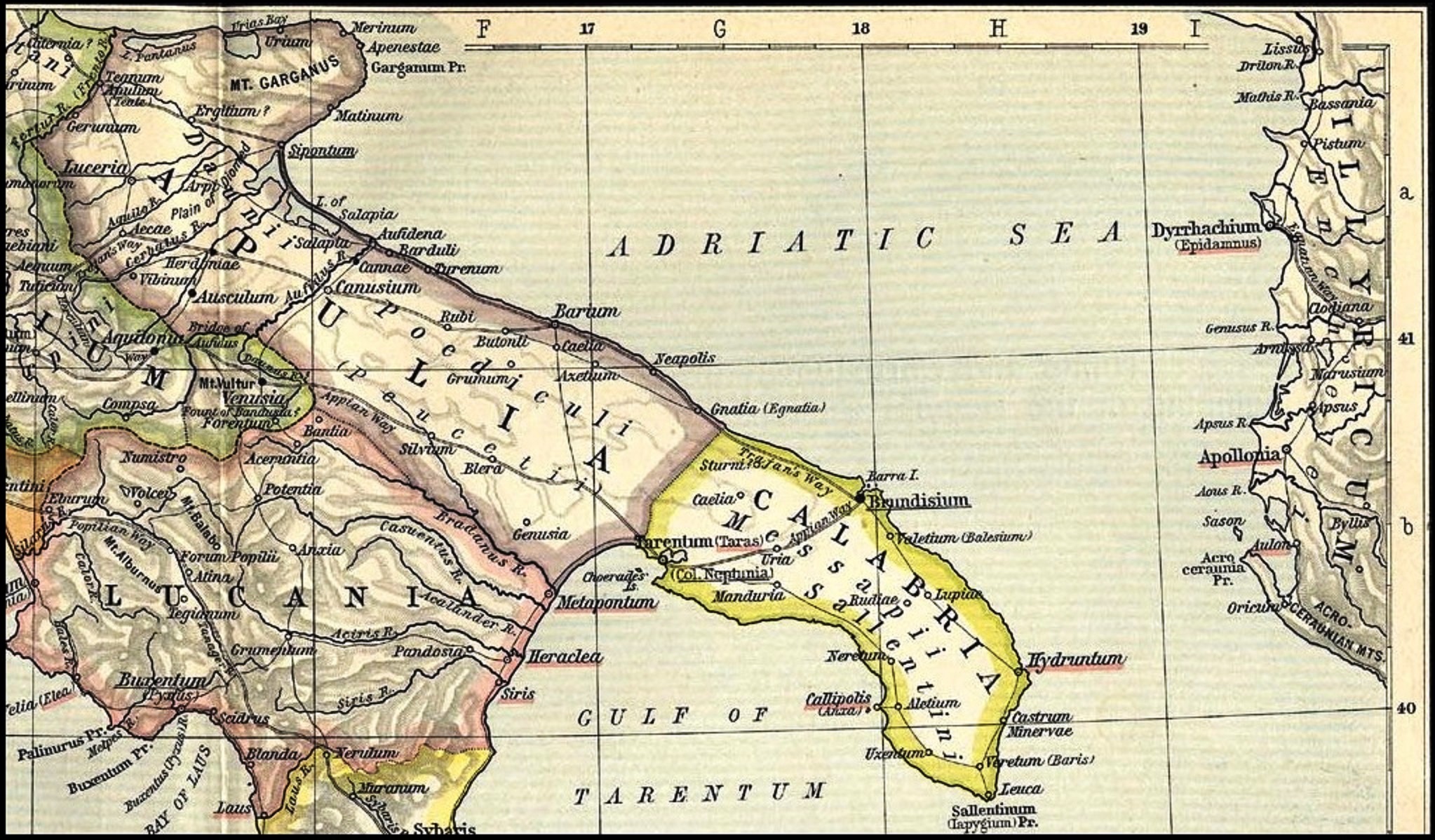|
Taras (mythology)
In Greek mythology, Taras ( grc, Τάρας) was the eponymous founder of the Greek colony of Taras (Tarentum, modern Taranto), in Magna Graecia (today South Italy). Family Taras was the son of Poseidon and Satyrion, either a Tarentine nymph or a daughter of Minos. Mythology When Taras was shipwrecked, his father rescued him by sending a dolphin which he rode to traverse the sea from the promontory of Taenarum to the south of Italy. Brought ashore, Taras founded Tarentum which was named in his honour. According to Pausanias, he was worshiped as a hero who named both the city and the river, Taras after himself. Taranto Note that a harbour close by Taranto is still called Torre Saturo (derived from Satyrion). It was in Torre Saturo, almost south of Taranto, that Spartan colonists settled their first colony in Taranto zone. Later, around 706 BC, they conquered the Iapygian city of Taranto. On the coinage of the ancient city of Taras, the son of Poseidon is depicted on a dolp ... [...More Info...] [...Related Items...] OR: [Wikipedia] [Google] [Baidu] |
Tarentum Incuse Nomos 769750
Tarentum may refer to: * Taranto, Apulia, Italy, on the site of the ancient Roman city of Tarentum (formerly the Greek colony of Taras) **See also History of Taranto * Tarentum (Campus Martius), also Terentum, an area in or on the edge of the Campus Martius in Rome * Tarentum, Pennsylvania, United States ** Tarentum Bridge, in the above place * List of Empire ships - B#Empire Bess, ST ''Tarentum'', a tug in service with Società Rim. Napoletani (1962–82); originally known as ''Empire Bess'' See also * {{disambig, geo ... [...More Info...] [...Related Items...] OR: [Wikipedia] [Google] [Baidu] |
Iapygians
The Iapygians or Apulians (; el, Ἰάπυγες, ''Ĭāpyges''; la, Iāpyges, Iapygii, Umbrian ''Iabuscer'') were an Indo-European-speaking people, dwelling in an eponymous region of the southeastern Italian Peninsula named Iapygia (modern Apulia) between the beginning of the first millennium BC and the first century BC. They were divided into three tribal groups: the Daunians, Peucetians and Messapians. After their lands were gradually colonized by the Romans from the late 4th century onward and eventually annexed to the Roman Republic by the early 1st century BC, Iapygians were fully Latinized and assimilated into Roman culture. Name The region was known to the Greeks of the 5th century BC as ''Iapygía'' (Ἰαπυγία), and its inhabitants as the ''Iápyges'' (Ἰάπυγες). It was probably the term used by the indigenous peoples to designate themselves. The name ''Iapyges'' has also been compared to that of the ''Iapydes'', an Illyrian tribe of northern Dalmatia. S ... [...More Info...] [...Related Items...] OR: [Wikipedia] [Google] [Baidu] |
Apollo
Apollo, grc, Ἀπόλλωνος, Apóllōnos, label=genitive , ; , grc-dor, Ἀπέλλων, Apéllōn, ; grc, Ἀπείλων, Apeílōn, label=Arcadocypriot Greek, ; grc-aeo, Ἄπλουν, Áploun, la, Apollō, la, Apollinis, label=genitive, , ; , is one of the Olympian deities in classical Greek and Roman religion and Greek and Roman mythology. The national divinity of the Greeks, Apollo has been recognized as a god of archery, music and dance, truth and prophecy, healing and diseases, the Sun and light, poetry, and more. One of the most important and complex of the Greek gods, he is the son of Zeus and Leto, and the twin brother of Artemis, goddess of the hunt. Seen as the most beautiful god and the ideal of the ''kouros'' (ephebe, or a beardless, athletic youth), Apollo is considered to be the most Greek of all the gods. Apollo is known in Greek-influenced Etruscan mythology as ''Apulu''. As the patron deity of Delphi (''Apollo Pythios''), Apollo is an oracul ... [...More Info...] [...Related Items...] OR: [Wikipedia] [Google] [Baidu] |


